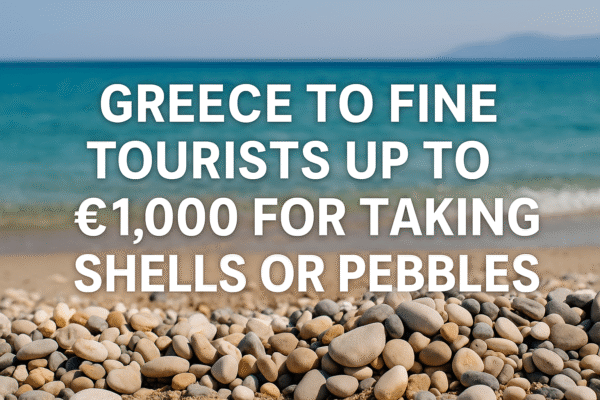Greece has stepped into the circle of countries enforcing tough new regulations that penalize tourists for pocketing natural souvenirs like shells or pebbles. With fines reaching up to €1,000, Greece now stands alongside other European nations—including the US, Iceland, France, the UK, Italy, and Spain—in strengthening rules that protect fragile ecosystems, coastal landscapes, and cultural sites.
This initiative reflects a broader shift toward embedding conservation into tourism policy. Gone are the days when grabbing a small beach keepsake was considered harmless. These laws send a clear message: nature and heritage are to be photographed, not pocketed.
Stricter Penalties to Preserve Beaches and Historic Sites
Greece’s sunny coastlines, turquoise waters, and centuries-old ruins draw millions annually—making preservation vital. Starting in 2025, Greek authorities now impose fines of up to €1,000 for removing natural materials from beaches. On archaeological islands such as Naxos, authorities have even installed fences to deter souvenir theft from ancient sites, reinforcing the view that such acts are cultural offenses.
A further beach regulation ensures that 70 percent of public beach areas remain free of sunbeds and rentals, safeguarding open access and resisting the privatization of shared spaces.
How This Fits a Wider European Conservation Trend
Greece’s move echoes policies across Europe:
- France prohibits the removal of shells, pebbles, and sand—violators may face fines up to €1,500, with penalties soaring to €150,000 for uprooting protected coastal flowers.
- Iceland imposes fines between €500 and €3,000 for collecting volcanic rocks or sand.
- Italy, particularly in Sardinia and at Pompeii, enforces fines up to €3,000 for sand removal and up to €1,500, plus possible prison time, for taking ancient fragments.
- In the UK, taking pebbles, shells, or driftwood can cost up to £1,000, as such items play key roles in coastal erosion defense.
This growing consensus among nations underlines a shift: souvenirs should be digital, not tangible.
Why These Rules Are Important
- Environmental Stability: Even small removals of shells, pebbles, or sand contribute to coastline erosion and habitat loss.
- Heritage Protection: Ancient ruins and landscapes suffer when visitors disrupt or take physical elements.
- Tourism Sustainability: Preserving the environment ensures that the natural beauty travelers seek remains intact for future visitors.
By reinforcing these rules, countries like Greece aim to balance tourism with environmental stewardship.
Tips for Tourists to Avoid Costly Blunders
- Leave natural items in place. Admire, photograph, but don’t pocket.
- Stick to local crafts. Choose ceramics, olive oil, art prints, or other regionally made souvenirs.
- Follow signage and staff guidance, especially at sensitive sites like archaeological ruins or public beaches.
- Dress appropriately at historical sites—avoid high heels that are banned due to damage risks.
- Respect beach layouts. In Greece, public spaces must stay clear for everyone; sunbed-free zones are common.
Spotlight: Greece’s Sites of Concern
- Beaches: Popular spots like Santorini’s volcanic Red Beach or Crete’s stunning shores are protected—removing pebbles or shells could mean a hefty fine.
- Historical Areas: Monuments like the Acropolis and Naxos’s ancient sites now have stricter controls and monitoring to preserve their integrity.
- Public Beach Policy: Overcrowding and private commercialization are being curbed by ensuring significant sand areas remain open and accessible.
Tourists are encouraged to treasure memories, not souvenirs.
Final Thought: Respect Over Regret
Greece—and Europe broadly—is sending a firm, friendly message: respect the environment, or pay up. These rules aren’t meant to spoil vacations but to preserve natural wonders for everyone.
Remember: the best memento is a photo, not a bag of shells.
For more travel news like this, keep reading Global Travel Wire


















